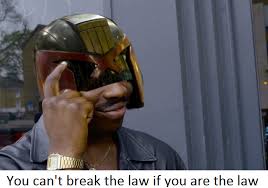Supreme Court Justice Samuel Alito no doubt intended to shock the political world when he told interviewers for the Wall Street Journal that “No provision in the Constitution gives [Congress] the authority to regulate the Supreme Court — period.”
Many observers dismissed his comment out of hand, noting the express language in Article III, establishing the court’s jurisdiction under “such regulations as the Congress shall make.”
But Alito wasn’t bluffing. His recently issued statement, declining to recuse himself in a controversial case, was issued without a single citation or reference to the controlling federal statute. Nor did he mention or adhere to the test for recusal that other justices have acknowledged in similar circumstances. It was as though he declared himself above the law.
No part of the Constitution gives the Supreme Court the power of judicial review either. The court created that power out of nothing. If you wanna get pissy, Alito.
He seems to think he’s above the Constitution. Probably thinks he’s Judge Dredd.
To the iso-cubes with them
I don’t know why but I can’t picture Alito in a full suite of armour with helmet and sidegun and all… the image I have of him with such a loadout on himself is that of a frail, weak, elderly man blabbering about his authority on people’s life…
Wait, that’s how I would see more or less anyone of that sort nowadays.
Maybe American institutions nedd a bit of a refresher
And he always wants to get pissy.
Regardless, the constitution very clearly does have language establishing that Congress can regulate the SC. Alito should be embarrassed to be spewing such baldfaced and easily disproved bullshit, but here we are
I made the same point elsewhere in this thread… But in fairness, the Constitution gives them final judicial appeal power (pretty much word-for-word).
It’s an interestingly thin line that their judicial decision about any dispute is binding. It’s clear they have judicial decision about any dispute of fact. From that, it seems obvious in retrospect that would give them final appeal power on any dispute of law as well. Ironically, that they aren’t the final decisionmaker on State Law seems the oddity based upon the wording of their mandate.
That’s the point of a judiciary, sadly. If two parties disagree on something relevant, we’re supposed to have a neutral arbitration about which party is correct. One party says “the Constitution does not allow abortions” and the other party says “that’s not how it looks to me”. Lacking congressional action, there’s already relevant law one way or the other and people are disagreeing on which way the law goes. In an ideal world, a “free” country should err any ambiguity on the side of individual freedom, but even then there’s a disagreement on whether a fetus could legally be seen as an individual.
I think the problem with Marbury is that nobody saw exactly how broken the idea of having one authority to decide “who decides what is true when two parties disagree on the facts?” could extend. As the US court is a Common Law court, I wonder how much of that comes from European judicial style anyway.
Wow what a stupid misunderstanding you’ve spent so many paragraphs elucidating on.
Not exactly sure why you had to give that useless reply, but have a nice life.
EDIT: Also if 4 paragraphs is “so many”, you might need to retake 4th grade :)
Add more justices to the court. Then Alito’s opinion will not matter so much.
The Judiciary Act of 1869 sets the size of the Supreme Court at 9. Congress would have to pass a law to make that happen.
In order:
The Republican controlled House won’t vote for it.
Republicans in the Senate would filibuster it.
Democrats in the Senate will never get rid of the filibuster because they love their procedural excuse for breaking campaign promises.
Yes but according to Alito, Congress has no power over the supreme court so that act is moot and anyone can just make up a number.
Lol. Nice.
Dissolve the court. Arrest Alito, Thomas, Gorsuch and Kavanaugh - the crimes committed by those four are known to the public. Appoint a special investigator for each remaining justice. If they’ve so much as taken a stick of chewing gum from someone with business before the court imprison them too. Every one of them is delinquent in their duty to preserve the impartiality and legitimacy of the court. Every one of them has cosigned Alito’s statement that the court is above regulation. Every one of them endorses this clown show where the highest court in the land is blatantly, publicly for sale. If they won’t protect the legitimacy of the court we need to take steps to protect the legitimacy of the court from them. They can declare themselves immune from prosecution but no one is immune from the will of a people united in their support for real justice.
Hey I thought we had rules against porn here
I’m above the rules
Dissolve the court, arrest reverendsteveii

The Supreme Court should be elected by popular vote and have to be reconfirmed by the states every four years.
One national election every four years is enough for me. I can’t even imagine what the campaigns for judges with the power to rewrite the Constitution through creative interpretation would look like, but if they can put Trump in the White House, they could put him on the Supreme Court.
Term limits. Active oversight. Maybe go back to requiring 60+ votes to confirm so the GOP can’t shove the Federalist Society hack-of-the-day through with a simple majority.
The problem with requiring 60 plus votes is that it’s would be open season for the GOP to prevent nominations, then the second they had the Senate again, they’d remove the rule. Just like they did the last time.
Offset by two years from the Presidential election.
Yeah, because midterms have great turnout.
That would be the draw would it not?
That’s how you get Trump on the Supreme Court. Elected justices is not great.
My solution is ~16 year terms spaced out like Senate terms, where if the person dies or retires the appointment just fills out their term, and each presidential term gets an appointment or two. Removes the benefit of appointing someone young so we can have more experience on the court.
My country solved the problem by having 9 years non renewable terms and requiring a 2/3 majority in the parliament to elect a judge. This avoids them thinking they are the state and prevents any hyper partisan hack from entering the court. Of course this is only possible because none of the major parties is trying to make the state implode but it works well.
Australia has age limits.
What happens when no party can get a 2/3 majority or no house can achieve a 2/3 plurality?
There’s an agreement between the parties to nominate the judges. The center right and center left parties nominate most the judges and there are a few places reserved for the parties more to the right and left, in a way that keeps a balance between judges nominated by right wing and left wing parties. Sometimes a party will try to nominate someone that gets rejected by the other parties and then they have to pick someone else, but usually the process is a footnote in the news.
Sounds nice to have a functioning government of civil legislators.
9 justices 18 year terms. Staggered so that every 2 year election cycle 1 justice is up for election by popular vote. Required to be member of Bar in at least one state.
You can get Trump now, that isn’t any different.
I’m going to say n- and r-words here. National referrendum.
Wheew. I thought you were going to say National Razor.
Abolish the Supreme Court.
Why would he ever bluff? He holds all the cards!
Congress gives a major check on the Supreme Court: they’re the only branch without access to the military. They can make their decisions, and they can attempt to enforce them. But they oughta remember that they’re the ones with no sway on enforcement
This is the best summary I could come up with:
Durbin detailed the ethics problems raised by Alito’s two-part interview in the Wall Street Journal, which was conducted by journalist James Taranto and David Rivkin, a practicing lawyer.
Rivkin happens to be counsel of record in Moore v. United States, a major case that was pending in the Supreme Court at the time of the interview and is now set for argument, which may determine the federal government’s authority ever to impose a tax on “unrealized gains” or wealth.
The actual law, in Scalia’s words, requires Alito to determine whether a “reasonable observer who is informed of all the surrounding facts and circumstance” would doubt his ability to exercise detached judgment, given his mid-case work with Rivkin.
The frequent recusals could easily be avoided by investing only in mutual funds (as do the other seven justices), but Alito has obviously chosen to place his personal financial choices ahead of the court’s need for participation by all nine members.
He has so far “voluntarily complied” with other federal ethics statutes, including financial disclosure requirements, but perhaps he will eventually decide there is no “sound reason” for him to keep reporting on his stock holdings.
In May, he told a meeting of the American Law Institute that “I want to assure people that I’m committed to making certain that we as a court adhere to the highest standards of conduct,” and “We are continuing to look at things we can do to give practical effect to that commitment.” At least two other justices — Elena Kagan and Brett Kavanaugh — appear to agree with the chief.
The original article contains 975 words, the summary contains 252 words. Saved 74%. I’m a bot and I’m open source!
Trollito is one angry white man, that’s for sure.
I mean, he’s not wrong, he’s just being an asshole about it. :)
The Constitution gives two controls on the Supreme Court:
-
Nominees are made by the Executive branch and confirmed by the Senate.
-
Impeachment.
That’s it. There’s nothing else in the Constitution about judicial ethics, or recusals, or anything else.
There isn’t even really a control on bad or unpopular decisions by the court. It isn’t like the relationship between Congress and the executive where they pass laws and the President signs or vetos them and congress can over-ride the veto power.
When the Supreme Court makes an unpopular decision, the only recourse is for Congress to pass a new Amendment.
In all cases affecting ambassadors, other public ministers and consuls, and those in which a state shall be party, the Supreme Court shall have original jurisdiction. In all the other cases before mentioned, the Supreme Court shall have appellate jurisdiction, both as to law and fact, with such exceptions, and under such regulations as the Congress shall make.
The Supreme Court is regulated by Congress except as itemized in the first sentence of this paragraph. They are also supposed to be the first and only court to see cases involving a state or other public official (ministers).
That’s not what that means though.
“In all cases affecting ambassadors, other public ministers and consuls, and those in which a state shall be party, the Supreme Court shall have original jurisdiction.”
So for ambassadors, other public ministers and consuls, and those in which a state shall be party, the Supreme Court is the original arbiter of truth.
“In all the other cases before mentioned, the Supreme Court shall have appellate jurisdiction, both as to law and fact”
For everything else, some other body is in control and the Supreme Court serves merely as an apellate court. If you don’t like how the original body has ruled, you can appeal that to the Supreme Court.
“with such exceptions, and under such regulations as the Congress shall make.”
Congress is that other body, which has no say over ambassadors, other public ministers and consuls, and those in which a state shall be party, everything else Congress does can be appealed to the Supreme Court.
That paragraph doesn’t give Congress control over the Supreme Court, it gives the Supreme Court appeallate power over everything Congress does.
Or pack the court with judges aligned to their interests to overturn 40 year old precedent.
Congress can’t do that, they can only approve who the executive sends them.
-
That’s not really surprising. SCOTUS was designed to be out of reach of the Legislative and Executive branches of government. That’s an 8th grade civics level of understanding. If Congress doesn’t like it they can impeach.
It’s part of the system of checks and balances. The three branches of government were designed to keep each other in check. It’s not working so well in practice, but that’s the intention.
Coequal branches of government, that’s well below an 8th grade civics understanding. Crazy that people genuinely believe the Supreme Court is untouchable by congress and the executive, who do they think appoints them?
Lobbyists, mostly.
A practice that should be made illegal
It is untouchable by the executive, while congress acting in concert between the house and senate could do literally anything, including abandoning the constitution itself and making a new one.
Not untouchable. But out of reach of the day to day politics of that branch. Congress can Impeach a SCOTUS member if they truly believe that they’ve done wrong. But the super-majority requirement of impeachment means that it has to be a decision that’s above general politics.
The same idea is why only the Senate advises on their appointments. The Senate was believed to be a body that would be above petty politics given that it’s members were to be appointed by the legislatures of the states. So the idea of a heavily partisan judge to get appointed was believed to be minimized.
Uhh…
…the supreme Court shall have appellate Jurisdiction, both as to Law and Fact, with such Exceptions, and under such Regulations as the Congress shall make.
Article III of the US Constitution would like to have a word with your 8th-grade civics teacher.
Yes, an 8th grade civics understanding is clear that SCOTUS is an independent branch. But an 8th grade civics understanding should cover checks and balances too. And impeachment is not the only one.
The other ones rely on funding and appointments and lower court mechanics.
I mean, if you want get into it, the concept of Judicial Review is something the supreme Court made up for itself in 1803.
SCOTUS should only be subject to dark money and billionaire “philanthropists”.












